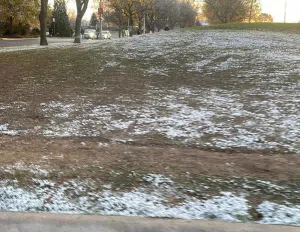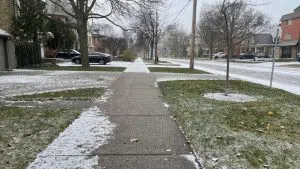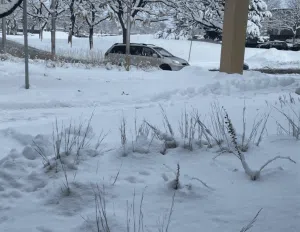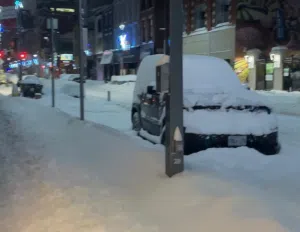Many in London, Ont., wonder if this winter will bring plenty of snow, especially after the city was blanketed in white during the first week of December—a stark contrast to the weather in 2023. As the countdown to Santa’s arrival continues, the city’s unpredictable winter leaves people guessing whether they’ll wake up to a white Christmas in 2024.

(First flurries 2023: Oct. 31. Photo: Nov. 1, 2023. Credit: Roger Farias)
There is currently nothing more uncertain than the climate and its variations, driven by climate change caused by industries, consumerist actions, and a lack of societal awareness.
Since 2021, Christmas in The Forest City has been snowless, with the holiday remaining snow-free despite occasional flurries or light snowfall in the weeks leading up to it. However, this year, snow squalls appeared on Dec. 2. The first major snowstorm in three years led to the closure of many city facilities, schools, libraries, offices, and in-person services on Dec. 5 and 6 due to inclement weather.
Dr. James Voogt, professor in the Department of Geography and Environment at Western University, said the monthly outlook suggests December will have normal temperatures and precipitation. “El Nino is currently neutral, but a weak La Nina is forecast in the Pacific later in December. Model simulations indicate below-normal temperatures for the second week of December, likely switching to above-normal temperatures afterward,” he added.

(First flurries 2024: Nov. 8. Credit: Roger Farias)
Voogt explained that snow cover impacts the environment, cultural activities, and tourism, with both benefits and challenges. “If you go further north, then it becomes important even to things like transportation. Many people enjoy not having snow to shovel and the city doesn’t have to clear the streets; which has budget implications. So, there are some upsides to not having snow as well as downsides.”

Dec. 2, 2024. Credit: Roger Farias)
Patsy Morgan, raised in London, shared her thoughts on snow, the holidays, and climate change. ‘As Canadians, we enjoy many winter activities and sports as families. It’s important to recognize when it’s unseasonably warm because that’s affecting our future and the future of our children,’ she said. She noted that some people enjoy the lack of snow because it makes travel easier and eliminates concerns about winter storms, but climate change is top of mind when Londoners wonder about a white Christmas.
Dr. Gordon McBean, professor emeritus at Western University and expert in climate change science, natural hazards prediction, and mitigation, noted: “It’s very important that we, as all people, reduce the impact we’re having on the environment and, in direct ways, on the economies because that affects everyone,” he said. “We need to ask ourselves: do we need this? We need to get those things that are of environmentally friendly construction, or things that don’t have environmental impacts.”

(Dec. 5, 2024 in the evening. Credit: Roger Farias)
Statistics Canada indicates that Canada throws away over three million tons of plastic waste every year. Only 9% is recycled, while the rest ends up in landfills, waste-to-energy facilities, or the environment. About that, Dr. Gordon McBean explained how citizens can contribute to tackling this challenge. ‘The City of London has an environmental strategy aimed at reducing its impacts, and all surrounding communities are working towards similar goals. We’re starting to see these efforts ramping up with more positive outcomes,’ he added.
Dr. McBean noted that citizens need to engage with their local communities and find ways to help. ‘We don’t need more junk. Let’s reduce the amount of garbage we’re producing by better using food, as well as our personal belongings and equipment,’ he concluded.”

(Downtown on Dec. 25, 2023. Credit: Roger Farias)
Locals will need to wait until Dec. 19 to check Environment and Climate Change Canada’s seven-day forecast for the likelihood of a snow-covered Christmas Day. Anything is possible—perhaps God, nature, or Santa will bring a white Christmas to The Forest City again, though statistics suggest the chances are quite low.
Listen to more from these experts and other citizens on our Almost 107 Podcast, available wherever you get your podcasts or at the following link:




